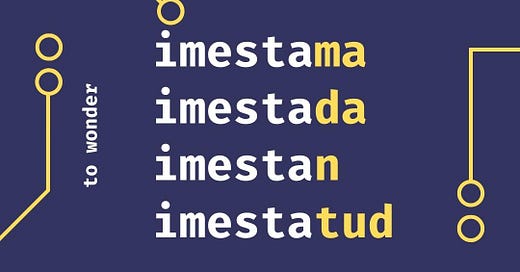to marvel, to be surprised
Building blocks
ime- wonder
-sta- causative (“make something be X”)
-ma - infinitive ending
It’s derived from Proto-Finnic: imeh
How to use it
If the word imestama is followed by a noun (you are wondering about something specific), then it is in the genitive case + you add the word: üle - over (eg. imestama elu üle - wondering over life).
Examples
Imestan tänase ilma üle
Literally: “I am surprised today’s weather over”
Idiomatically: “I am surprised about today’s weather”
When talking about the weather the more accurate term to use when translating into English is: to be surprised (instead of to wonder).
Imestan - Verb - 1P Present Sg, "I am surprised"
tänase - Adjective - Gen Sg, "today's"
ilma - Noun - Gen Sg, "weather"
üle - Adverb, "about"Imestan, et täna on selline ilm.
Literally: “I am surprised that today is such weather”
Idiomatically: “I am surprised about today’s weather”
Imestan - Verb - 1P Present Sg, "I am surprised"
et - Conjunction - "that"
täna - Adverb, "today"
on - Verb - 3P Present Sg, "is"
selline - Pronoun - Nom Sg, "such"
ilm - Noun - Nom Sg, "weather"



